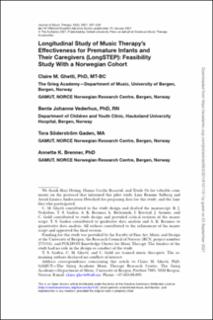| dc.contributor.author | Ghetti, Claire | |
| dc.contributor.author | Vederhus, Bente Johanne | |
| dc.contributor.author | Gaden, Tora Söderström | |
| dc.contributor.author | Brenner, Annette | |
| dc.contributor.author | Bieleninik, Lucja | |
| dc.contributor.author | Kvestad, Ingrid | |
| dc.contributor.author | Assmus, Jörg | |
| dc.contributor.author | Gold, Christian | |
| dc.date.accessioned | 2021-09-05T15:39:20Z | |
| dc.date.available | 2021-09-05T15:39:20Z | |
| dc.date.created | 2021-01-27T21:37:32Z | |
| dc.date.issued | 2021 | |
| dc.identifier.citation | The Journal of music therapy. 2021, . | en_US |
| dc.identifier.issn | 0022-2917 | |
| dc.identifier.uri | https://hdl.handle.net/11250/2773608 | |
| dc.description.abstract | Premature infants and their parents experience significant stress during the perinatal period. Music therapy (MT) may support maternal–infant bonding during this critical period, but studies measuring impact across the infant’s first year are lacking. This nonrandomized feasibility study used quantitative and qualitative methods within a critical realist perspective to evaluate the feasibility, acceptability, and suitability of the treatment arm of the Longitudinal Study of music Therapy’s Effectiveness for Premature infants and their caregivers (LongSTEP) (NCT03564184) trial with a Norwegian cohort (N = 3). Families were offered MT emphasizing parent-led infant-directed singing during neonatal intensive care unit (NICU) hospitalization and across 3 months post-discharge. We used inductive thematic analysis of semi-structured interviews with parents at discharge from NICU and at 3 months and analyzed quantitative variables descriptively. Findings indicate that: (1) parents of pre- mature infants are willing to participate in MT research where parental voice is a main means of musical interaction; (2) parents are generally willing to engage in MT in NICU and post-discharge phases, finding it particularly interesting to note infant responsiveness and interaction over time; (3) parents seek information about the aims and specific processes involved in MT; (4) the selected self-reports are reasonable to complete; and (5) the Postpartum Bonding Questionnaire appears to be a suitable measure of impaired maternal–infant bonding. Parents re- ported that they were able to transfer resources honed during MT to parent–infant interactions outside MT and recognized parental voice as a central means of building relation with their infants. Results inform the implementation of a subsequent multinational trial that will address an important gap in knowledge. | en_US |
| dc.language.iso | eng | en_US |
| dc.relation.uri | https://app.cristin.no/projects/show.jsf?id=674018 | |
| dc.rights | Navngivelse 4.0 Internasjonal | * |
| dc.rights.uri | http://creativecommons.org/licenses/by/4.0/deed.no | * |
| dc.title | Longitudinal Study of music Therapy's Effectiveness for Premature infants and their caregivers (LongSTEP): Feasibility study with a Norwegian cohort | en_US |
| dc.type | Journal article | en_US |
| dc.type | Peer reviewed | en_US |
| dc.rights.holder | Copyright © 2021, Authors | |
| dc.description.version | publishedVersion | en_US |
| cristin.ispublished | true | |
| cristin.fulltext | original | |
| cristin.qualitycode | 2 | |
| dc.identifier.doi | 10.1093/jmt/thaa023 | |
| dc.identifier.cristin | 1880779 | |
| dc.source.journal | The Journal of music therapy | en_US |
| dc.source.pagenumber | 40 | en_US |
| dc.relation.project | Norges forskningsråd: 273534 | en_US |

